Salima Mdhaffar
Pantagruel: Unified Self-Supervised Encoders for French Text and Speech
Jan 09, 2026Abstract:We release Pantagruel models, a new family of self-supervised encoder models for French text and speech. Instead of predicting modality-tailored targets such as textual tokens or speech units, Pantagruel learns contextualized target representations in the feature space, allowing modality-specific encoders to capture linguistic and acoustic regularities more effectively. Separate models are pre-trained on large-scale French corpora, including Wikipedia, OSCAR and CroissantLLM for text, together with MultilingualLibriSpeech, LeBenchmark, and INA-100k for speech. INA-100k is a newly introduced 100,000-hour corpus of French audio derived from the archives of the Institut National de l'Audiovisuel (INA), the national repository of French radio and television broadcasts, providing highly diverse audio data. We evaluate Pantagruel across a broad range of downstream tasks spanning both modalities, including those from the standard French benchmarks such as FLUE or LeBenchmark. Across these tasks, Pantagruel models show competitive or superior performance compared to strong French baselines such as CamemBERT, FlauBERT, and LeBenchmark2.0, while maintaining a shared architecture that can seamlessly handle either speech or text inputs. These results confirm the effectiveness of feature-space self-supervised objectives for French representation learning and highlight Pantagruel as a robust foundation for multimodal speech-text understanding.
TEDxTN: A Three-way Speech Translation Corpus for Code-Switched Tunisian Arabic - English
Nov 13, 2025Abstract:In this paper, we introduce TEDxTN, the first publicly available Tunisian Arabic to English speech translation dataset. This work is in line with the ongoing effort to mitigate the data scarcity obstacle for a number of Arabic dialects. We collected, segmented, transcribed and translated 108 TEDx talks following our internally developed annotations guidelines. The collected talks represent 25 hours of speech with code-switching that cover speakers with various accents from over 11 different regions of Tunisia. We make the annotation guidelines and corpus publicly available. This will enable the extension of TEDxTN to new talks as they become available. We also report results for strong baseline systems of Speech Recognition and Speech Translation using multiple pre-trained and fine-tuned end-to-end models. This corpus is the first open source and publicly available speech translation corpus of Code-Switching Tunisian dialect. We believe that this is a valuable resource that can motivate and facilitate further research on the natural language processing of Tunisian Dialect.
ELYADATA & LIA at NADI 2025: ASR and ADI Subtasks
Nov 13, 2025Abstract:This paper describes Elyadata \& LIA's joint submission to the NADI multi-dialectal Arabic Speech Processing 2025. We participated in the Spoken Arabic Dialect Identification (ADI) and multi-dialectal Arabic ASR subtasks. Our submission ranked first for the ADI subtask and second for the multi-dialectal Arabic ASR subtask among all participants. Our ADI system is a fine-tuned Whisper-large-v3 encoder with data augmentation. This system obtained the highest ADI accuracy score of \textbf{79.83\%} on the official test set. For multi-dialectal Arabic ASR, we fine-tuned SeamlessM4T-v2 Large (Egyptian variant) separately for each of the eight considered dialects. Overall, we obtained an average WER and CER of \textbf{38.54\%} and \textbf{14.53\%}, respectively, on the test set. Our results demonstrate the effectiveness of large pre-trained speech models with targeted fine-tuning for Arabic speech processing.
ADI-20: Arabic Dialect Identification dataset and models
Nov 13, 2025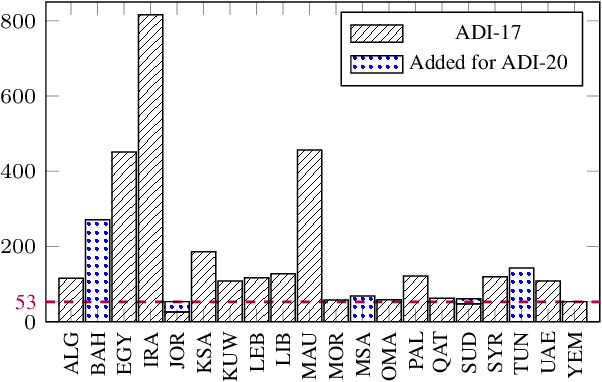


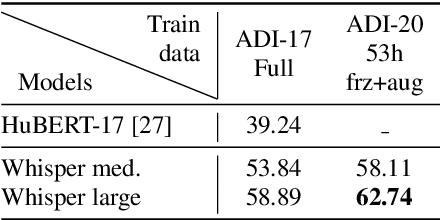
Abstract:We present ADI-20, an extension of the previously published ADI-17 Arabic Dialect Identification (ADI) dataset. ADI-20 covers all Arabic-speaking countries' dialects. It comprises 3,556 hours from 19 Arabic dialects in addition to Modern Standard Arabic (MSA). We used this dataset to train and evaluate various state-of-the-art ADI systems. We explored fine-tuning pre-trained ECAPA-TDNN-based models, as well as Whisper encoder blocks coupled with an attention pooling layer and a classification dense layer. We investigated the effect of (i) training data size and (ii) the model's number of parameters on identification performance. Our results show a small decrease in F1 score while using only 30% of the original training data. We open-source our collected data and trained models to enable the reproduction of our work, as well as support further research in ADI.
Towards a Unified Benchmark for Arabic Pronunciation Assessment: Quranic Recitation as Case Study
Jun 09, 2025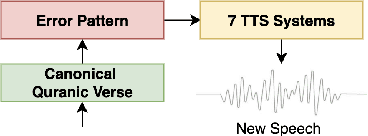
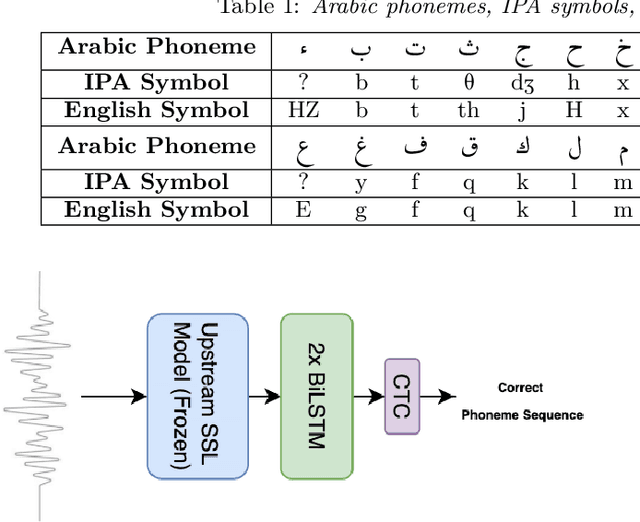
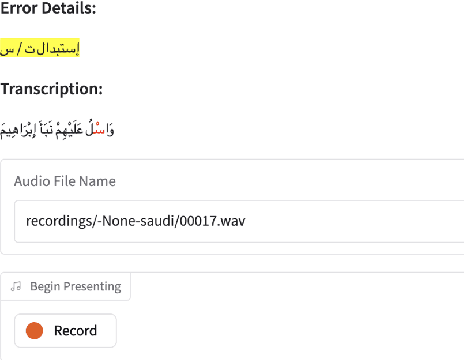
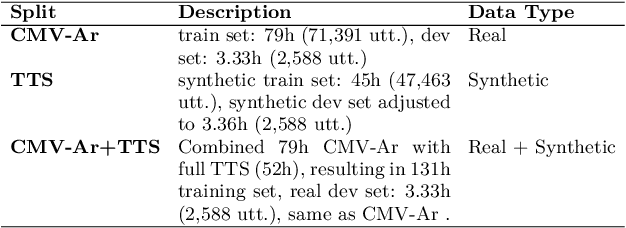
Abstract:We present a unified benchmark for mispronunciation detection in Modern Standard Arabic (MSA) using Qur'anic recitation as a case study. Our approach lays the groundwork for advancing Arabic pronunciation assessment by providing a comprehensive pipeline that spans data processing, the development of a specialized phoneme set tailored to the nuances of MSA pronunciation, and the creation of the first publicly available test set for this task, which we term as the Qur'anic Mispronunciation Benchmark (QuranMB.v1). Furthermore, we evaluate several baseline models to provide initial performance insights, thereby highlighting both the promise and the challenges inherent in assessing MSA pronunciation. By establishing this standardized framework, we aim to foster further research and development in pronunciation assessment in Arabic language technology and related applications.
Performance Analysis of Speech Encoders for Low-Resource SLU and ASR in Tunisian Dialect
Jul 05, 2024Abstract:Speech encoders pretrained through self-supervised learning (SSL) have demonstrated remarkable performance in various downstream tasks, including Spoken Language Understanding (SLU) and Automatic Speech Recognition (ASR). For instance, fine-tuning SSL models for such tasks has shown significant potential, leading to improvements in the SOTA performance across challenging datasets. In contrast to existing research, this paper contributes by comparing the effectiveness of SSL approaches in the context of (i) the low-resource spoken Tunisian Arabic dialect and (ii) its combination with a low-resource SLU and ASR scenario, where only a few semantic annotations are available for fine-tuning. We conduct experiments using many SSL speech encoders on the TARIC-SLU dataset. We use speech encoders that were pre-trained on either monolingual or multilingual speech data. Some of them have also been refined without in-domain nor Tunisian data through multimodal supervised teacher-student paradigm. This study yields numerous significant findings that we are discussing in this paper.
Open-Source Conversational AI with SpeechBrain 1.0
Jul 02, 2024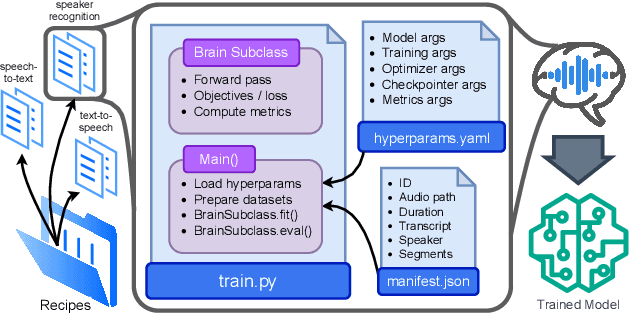

Abstract:SpeechBrain is an open-source Conversational AI toolkit based on PyTorch, focused particularly on speech processing tasks such as speech recognition, speech enhancement, speaker recognition, text-to-speech, and much more. It promotes transparency and replicability by releasing both the pre-trained models and the complete "recipes" of code and algorithms required for training them. This paper presents SpeechBrain 1.0, a significant milestone in the evolution of the toolkit, which now has over 200 recipes for speech, audio, and language processing tasks, and more than 100 models available on Hugging Face. SpeechBrain 1.0 introduces new technologies to support diverse learning modalities, Large Language Model (LLM) integration, and advanced decoding strategies, along with novel models, tasks, and modalities. It also includes a new benchmark repository, offering researchers a unified platform for evaluating models across diverse tasks
LeBenchmark 2.0: a Standardized, Replicable and Enhanced Framework for Self-supervised Representations of French Speech
Sep 11, 2023Abstract:Self-supervised learning (SSL) is at the origin of unprecedented improvements in many different domains including computer vision and natural language processing. Speech processing drastically benefitted from SSL as most of the current domain-related tasks are now being approached with pre-trained models. This work introduces LeBenchmark 2.0 an open-source framework for assessing and building SSL-equipped French speech technologies. It includes documented, large-scale and heterogeneous corpora with up to 14,000 hours of heterogeneous speech, ten pre-trained SSL wav2vec 2.0 models containing from 26 million to one billion learnable parameters shared with the community, and an evaluation protocol made of six downstream tasks to complement existing benchmarks. LeBenchmark 2.0 also presents unique perspectives on pre-trained SSL models for speech with the investigation of frozen versus fine-tuned downstream models, task-agnostic versus task-specific pre-trained models as well as a discussion on the carbon footprint of large-scale model training.
Federated Learning for ASR based on Wav2vec 2.0
Feb 20, 2023
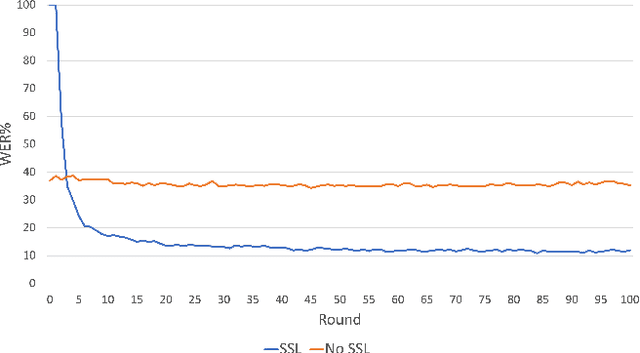
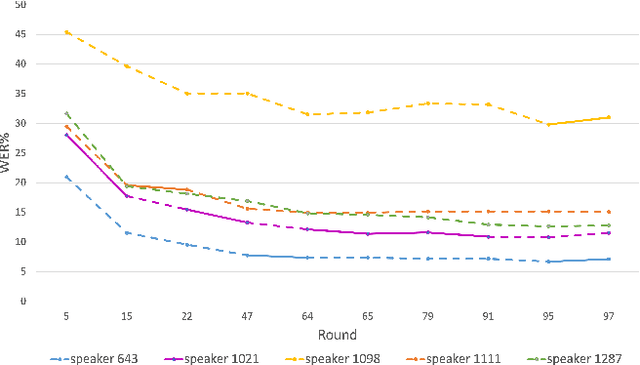
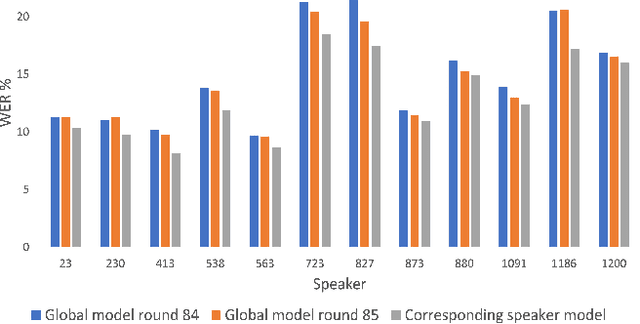
Abstract:This paper presents a study on the use of federated learning to train an ASR model based on a wav2vec 2.0 model pre-trained by self supervision. Carried out on the well-known TED-LIUM 3 dataset, our experiments show that such a model can obtain, with no use of a language model, a word error rate of 10.92% on the official TED-LIUM 3 test set, without sharing any data from the different users. We also analyse the ASR performance for speakers depending to their participation to the federated learning. Since federated learning was first introduced for privacy purposes, we also measure its ability to protect speaker identity. To do that, we exploit an approach to analyze information contained in exchanged models based on a neural network footprint on an indicator dataset. This analysis is made layer-wise and shows which layers in an exchanged wav2vec 2.0 based model bring the speaker identity information.
End-to-end model for named entity recognition from speech without paired training data
Apr 02, 2022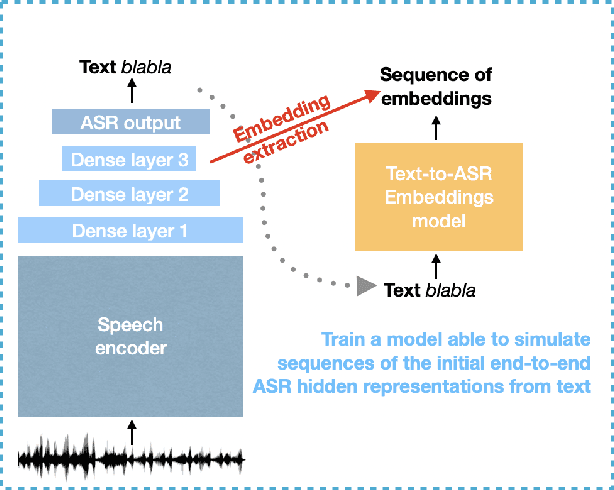
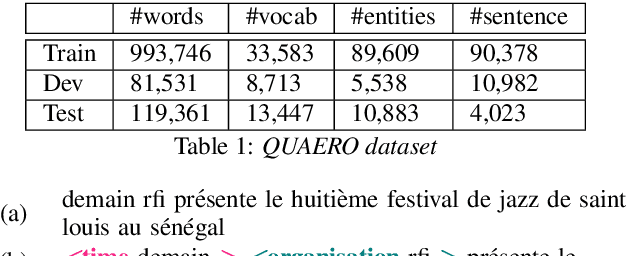
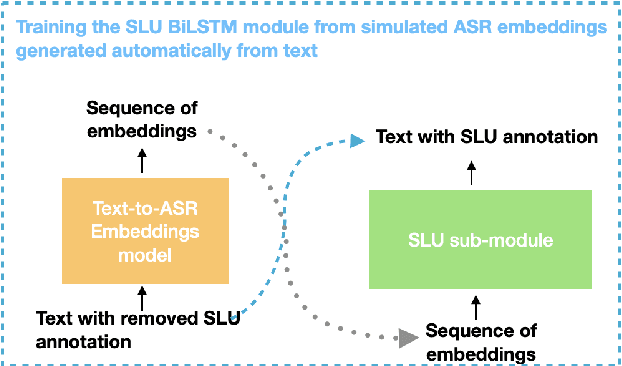
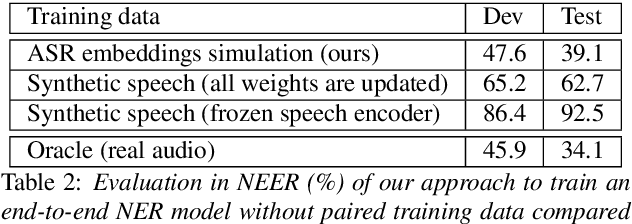
Abstract:Recent works showed that end-to-end neural approaches tend to become very popular for spoken language understanding (SLU). Through the term end-to-end, one considers the use of a single model optimized to extract semantic information directly from the speech signal. A major issue for such models is the lack of paired audio and textual data with semantic annotation. In this paper, we propose an approach to build an end-to-end neural model to extract semantic information in a scenario in which zero paired audio data is available. Our approach is based on the use of an external model trained to generate a sequence of vectorial representations from text. These representations mimic the hidden representations that could be generated inside an end-to-end automatic speech recognition (ASR) model by processing a speech signal. An SLU neural module is then trained using these representations as input and the annotated text as output. Last, the SLU module replaces the top layers of the ASR model to achieve the construction of the end-to-end model. Our experiments on named entity recognition, carried out on the QUAERO corpus, show that this approach is very promising, getting better results than a comparable cascade approach or than the use of synthetic voices.
 Add to Chrome
Add to Chrome Add to Firefox
Add to Firefox Add to Edge
Add to Edge